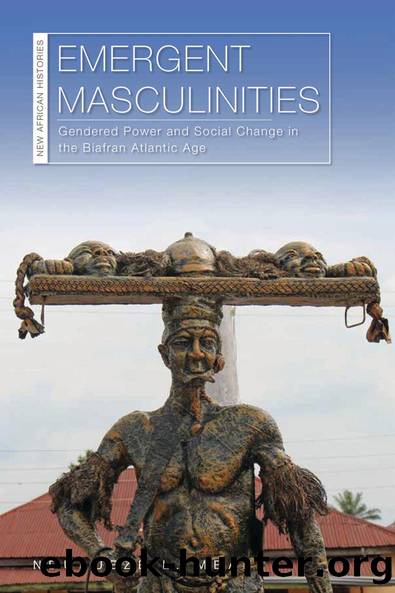Emergent Masculinities by Ndubueze L. Mbah

Author:Ndubueze L. Mbah [Mbah, Ndubueze L.]
Language: eng
Format: epub
ISBN: 9780821423899
Barnesnoble:
Publisher: Ohio University Press
Published: 2019-10-29T00:00:00+00:00
We need to focus on gender to get a full picture of emancipation in West Africa. Kaluâs life elucidates how a new powerful masculinity emerged with the changes that brought about the end of slavery. His mobility out of slavery highlights the new political and economic opportunities open to male slaves but unavailable to free women. It was only in the context of the late nineteenth-century social transformations that male slaves like Kalu profusely accomplished the ogaranya masculinity that ensured against reenslavement or permanent ujo status. The life history of this one individual provides a metanarrative on slavery dynamics and emancipation, colonial order and power, and tradition and adaptation in the context of gender, mobility, and social reordering. Avoiding the tyranny of possible reenslavement, Kalu positioned himself both in the shifting world of the indigenous, through guild-membership, slavery, polygamy, and ogaranya, as well as in the emerging world of Christianity, Western education, and colonial service, as a warrant chief. Kaluâs life draws our attention to the context in which men gained the upper hand in the first two decades of the colonial presence as men were favored by the Europeans to become Christian converts, go to school, and serve in various positions as colonial agents, while women were restricted to domestic spheres. This was the culmination of Biafran gendered Atlanticization.
Kaluâs freedom politics reshape conceptions of African slavery, resistance, and the role of cross-Atlantic influences in social change in the Bight of Biafra. He exemplifies that African slaves achieved freedom and social reintegration beyond the facilities of kinship, in his case by marshaling the moral economies of the Biafran coast, the Ohafia-Igbo, British colonists, and Scottish missionaries. His resistance to slavery and its lingering stigma involved an individualized reimagination of communityâa skillful manipulation of African and European social worlds to garner massive economic and political power.122 His life shows that individual slaves exhibited conscious resistance even in the absence of overt collective revolutionary class-consciousness.123 Kalu was emblematic of the cross-Atlantic commoditization and neocapitalist redefinition of hegemonic masculinity in the late nineteenth-century Bight of Biafra. His life history enables an African-centered conception of Atlantic influences over the longue durée, by showing the dialectics of slavery, legitimate commerce, colonialism, and Christianity in individual social transformations in the Bight of Biafra. His autobiography makes possible the reconstruction of the shifty subjectivity of an African individual in an era of rapid social change.
The next chapter shifts attention to the contradictory ways in which women, who were relatively marginalized from the control mechanisms of Biafran Atlanticization, simultaneously resisted sociopolitical disempowerment and reinforced masculinist conceptions of ogaranya.
Download
This site does not store any files on its server. We only index and link to content provided by other sites. Please contact the content providers to delete copyright contents if any and email us, we'll remove relevant links or contents immediately.
| Central Africa | East Africa |
| North Africa | Southern Africa |
| West Africa | Algeria |
| Egypt | Ethiopia |
| Kenya | Nigeria |
| South Africa | Sudan |
| Zimbabwe |
Goodbye Paradise(2971)
Men at Arms by Terry Pratchett(2408)
Tobruk by Peter Fitzsimons(2064)
Pirate Alley by Terry McKnight(1910)
Arabs by Eugene Rogan(1837)
Borders by unknow(1789)
Belonging by Unknown(1472)
The Biafra Story by Frederick Forsyth(1326)
It's Our Turn to Eat by Michela Wrong(1305)
Botswana--Culture Smart! by Michael Main(1238)
A Winter in Arabia by Freya Stark(1225)
Gandhi by Ramachandra Guha(1196)
Coffee: From Bean to Barista by Robert W. Thurston(1183)
Livingstone by Tim Jeal(1152)
The Falls by Unknown(1142)
The Source by James A. Michener(1135)
The Shield and The Sword by Ernle Bradford(1101)
Egyptian Mythology A Fascinating Guide to Understanding the Gods, Goddesses, Monsters, and Mortals (Greek Mythology - Norse Mythology - Egyptian Mythology) by Matt Clayton(1088)
Africa: Altered States, Ordinary Miracles by Richard Dowden(1078)
